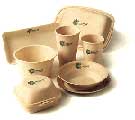
Plastic made from corn? How about carpet, clothes, dishes, and paint? It may sound funny now, but 100 years ago plant matter was the basis of almost all products. Petroleum increasingly replaced plants as society’s fundamental medium and by the 1980s almost eliminated biological materials as a source of products and fuels. Now, due to a confluence of factors – high petroleum prices, low crop prices, increasing environmental costs associated with using petroleum, better technology for making plant-based products, and government support – the tide may be turning again.
This transition is not small potatoes. David Morris, vice president of the Institute for Local Self-Reliance (ILSR), coined the term “carbohydrate economy” 15 years ago. Shifting society’s engine toward renewable, environmentally benign materials, where farmer-owned manufacturing enterprises process the crops they grow has enormously positive ramifications.
By substituting biochemicals – derived from vegetable oils, fiber and grain crops, citrus fruits, nuts and trees – to make industrial solvents, equipment lubricants, paints, and plastics, the environmental costs associated with the production, use and disposal of these products are greatly reduced. Pollution is no longer generated from extracting and processing crude oil into chemicals. End-of-life disposal is also not an issue – the products are completely biodegradable. Manufacturers are no longer saddled with high hazardous waste disposal costs, lengthy permit processes and compliance costs.
Since agricultural crops and residues are bulky, processing facilities are best located close to the source, making it a boon for rural economic development and the long-depressed farm economy. And taking petroleum out of the equation as a key ingredient in countless products reduces dependence on foreign oil supplies.
For all these reasons, the biobased industry is receiving increasing levels of government support. President Clinton signed two executive orders: Executive Order 13134, “Developing and Promoting BioBased Products and Bioenergy,” and Executive Order 13101, “Greening the Government through Waste Prevention, Recycling and Federal Acquisition.” The latter marks the first time “biobased products” appear as a category of environmentally preferable products in federal procurement policy.
In the current Administration, Department of Energy Secretary Abraham successfully protected the Ag Vision 2020 program from budget cuts. The program helps the agriculture, forestry and chemical industries use crops instead of petroleum as feedstocks to make products including plastics, paint and adhesives. The program’s goal is for plants to become the source of 10 percent of chemical feedstocks by 2020 – which translates into billions of dollars for farmers.
The major resin suppliers in the U.S. are Cargill Dow Polymers, Eastman Chemical and DuPont.
A Cargill Dow plant comes online by the end of 2001 to produce the resin, “NatureWorks™ PLA. The resin manufactured in the 140,000 ton facility will have numerous applications including, clothing and textiles, carpet tiles, diapers, feminine hygiene products, paints, coatings and pigments, cellophane, bags, wraps, films and other types of packaging. Sony, for example, plans to wrap its mini-discs in “plastic” made from this resin.
Cups, Plates, Spoons, Forks
Take disposable plastic dishware. About 60 billion cups, 20 billion eating utensils and 15 billion plates are used each year in the U.S., all destined for landfills or incinerators. Food scraps that could otherwise be composted must also be thrown away; it is not economical to separate it. Kentucky, New Jersey and California are the first states to introduce bills that limit the use of disposable plastic products.
The use of disposable cutlery, plates and cups is bound to continue in such venues as sporting arenas, where it constitutes 50 percent of the waste stream. What if the dishware is made of biobased plastic and is completely biodegradable? Then it would be an advantage to combine it with the food waste, put it in a bioplastic bag and send it to a composting facility (which has lower fees than landfills too). 
EarthShell, a nine-year old company based in Santa Barbara, California makes bioplastic dishware from a mix of potato starch, limestone, post-consumer recycled fiber, air, water and protective coatings. The potato starch comes from French fry and potato chip waste. Limestone is abundantly available and is a low cost feedstock. The result is dishware that completely biodegrades in compost and marine environments.
The company’s clamshell, soon to be in 300 U.S. McDonald’s outlets, requires significantly less energy throughout its lifecycle than the two main alternatives, polystyrene and paper. The clamshell is the only rigid food service packaging to receive Green Seal certification. Its cost is competitive with standard products and meets industry requirements for rigidity, insulation, stacking, consumer usage properties and graphics capabilities. Millions of clamshells have been put to the test during McDonald’s pilot period in 128 stores. EarthShell expects a bowls and plates to be commercially available by the end of 2001.
The Department of the Interior has been using EarthShell products in their main cafeteria for almost two years as part of a successful demonstration project. The products proved to be completely compostable in a USDA study. EarthShell has entered into a joint venture with Prairie Packaging, Inc., a supplier to SYSCO Corporation, the largest food service distributor in North America.
In Austria, Germany, and Sweden, McDonald’s uses utensils made from maize by an Italian company, Novamont. The company, which employs about 100 people, makes bio-plastic used in a variety of applications from compostable bags to crockery, from loose fill for packaging to diapers. According to the company, 75% of municipalities in Norway use their “plastic” bags to collect organic materials from households. Goodyear uses another form of the plastic in its Biotred GT3 tires as one way to reduce CO2 emissions. Novamont is working on its version of the clamshell from “plastic” foam.). 
Biocorp, an American company, uses Novam
ont’s resin to manufacture bioplastic food service products: plates, cutlery, hot drink cups and straws. The company also makes bags for the collection of food scraps and yard trimmings. It uses Cargill Dow’s resin to produce “plastic” cold-drink cups.
Biocorp supplied all the compostable cutlery (45 million spoons, forks, knives, coated cups, cup lids, straws, and plates) and the starch-based bags for the food scraps used at the Sydney Olympics, enabling 75 percent – over 5.7 million pounds – of waste generated at the Games to be recycled and composted. Although the products cost more than conventional plastic, the overall price is competitive when disposal costs are factored in. Biocorp estimates that large food service operations such as schools, hospitals, and fast food restaurants
can save up to 35 percent by composting food scraps instead of landfilling them.
Overcoming Obstacles
The bioplastic industry’s reputation suffered in its early years when some major companies made products that did not live up to biodegradability claims. Plastic grocery bags that included corn starch as a minor ingredient were touted as being completely biodegradable, but weren’t. Composters avoided the plastics because nondegradable plastics must be separated out, increasing operational costs. If they stay in the mix, they lower the value of the finished material. Prospective purchasers also became wary because the products did not perform well.
To verify the products are completely compostable, the U.S. Composting Council (USCC) and the International Biodegradable Products Institute have instituted the Compostable Logo Program. The symbol can appear on products and packages that conform to the American Society for Testing and Materials (ASTM) Standard D6400-99, “Standard Specifications for Compostable Plastics”.
The standard identifies plastic products that disintegrate and biodegrade completely and safely when composted in a municipal or commercial facility. A similar standard is used successfully in Germany, Belgium and Japan. The ultimate goal is to harmonize the various standards in favor of globally accepted criteria.
People around the world are very concerned about genetically modified agricultural crops and question whether bioplastic feedstocks such as corn contain GMOs. Novamont uses only GMO-free corn; Cargill Dow claims there is no GMO present in the final process.
Learn more:
EarthShell: [sorry this link is no longer available] John Nevling, Product Manager: nevling@earthshell.com
Cargill Dow: [sorry this link is no longer available] Mike O’Brien: Michael_O’Brien@cargilldow.com
Biocorp Inc.: [sorry this link is no longer available]
Novamont: http://www.novamont.com
International Biodegradable Products Institute: http://www.bpiworld.org
The Carbohydrate Economy Clearinghouse: [sorry this link is no longer available]USDA Biobased Industrial Products: [sorry this link is no longer available]
